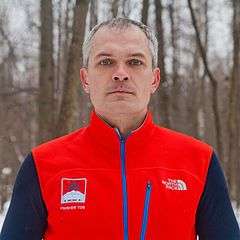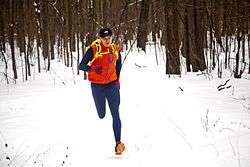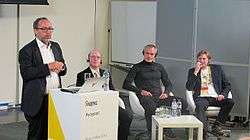Dmitry Erokhin
Dmitry Yurievich Erokhin (Russian: Дмитрий Юрьевич Ерохин, pronounced [ˈdmʲitrʲɪj ˈjurʲjɪvʲɪt͡ɕ jɪˈroxʲɪn]; born 1 November 1979 in Novokuznetsk) is a Russian ultramarathon and trail runner, amateur sports person and a public figure. He is known as a road running sports popularizer, healthy lifestyle promoter and Russian Wikimedia personality.
 2017 | |
| Personal information | |
|---|---|
| Native name | Дмитрий Юрьевич Ерохин |
| Full name | Dmitry Yurievich Erokhin |
| Nationality | Russian |
| Born | 1 November 1979 Novokuznetsk, Kemerovo Oblast, Russian Soviet Federative Socialist Republic |
| Residence | Moscow |
| Occupation | Lawyer |
| Years active | 2006-present |
| Height | 1.93 m (6 ft 4 in) |
| Weight | 88 kg (194 lb) |
| Sport | |
| Sport | Road running |
| Event(s) | Half marathon, ultramarathon, trail running |
| Club | Dynamo Sports Club |
| Coached by | Vsevolod Hudyakov |
| Achievements and titles | |
| Personal best(s) | 5 km — 18:44 (2014) 10 km — 37:14 (2014) Half marathon — 01:23:31 (2013) Marathon — 03:01:02 (2013) 100 km — 10:09:48 (2009) |
| Updated on 2 February 2017. | |
Biography
Dmitry Erokhin was born in Novokuznetsk, Kemerovo Oblast in 1979. He is currently a resident of Moscow district Golyanovo. He has a degree in law.[1]
Sports career beginning
In the summer of 2006 Dmitry Erokhin began running. He has said that he became involved in sports thanks to the book Running for Help by Andrey Chirkov. The author described 100 days of preparation for his first marathon:[2]
I didn't like sports, but I was inspired by this story. I immediately created the plan of my workouts and chose the date of the very next race for 100-days workout term. That was a marathon in Nizhny Novgorod. So in 96 days I realized what I had been planning.
— Dmitry Erokhin, snob.ru
Thanks to the same book, Erokhin got involved in ultramarathon races: in April 2009 he debuted in the 100 km Running Russian Championship in Pushchino, Moscow Oblast.[3][1] He came in 8th place and met the champion Vsevolod Hudyakov. Hudyakov has been Erokhin's coach since 2009.
Erokhin realized his propensity to extreme sports and took an interest in trail running.[2] In July 2008 he took part in first cross country running race at the Konzhak-XIII fell running marathon in the Northern Ural.[3][4] The first ultramarathon distance ran by Erokhin was the Salomon Race Karpatia 2012 in Ivano-Frankivsk Oblast, Ukraine.[3] He took part in this because there had not been any similar competitions in Russia yet.
Sahara-2013
The biggest and the most difficult of Erokhin's challenges in meaning of ambitious task and sports self-realization, from his personal opinion, was Marathon des Sables in Sahara in April 2013.[1] He began his preparations for Marathon des Sables in winter when the temperature was from -10 to -15 °C. The race in Sahara had to take 6 days, the distance was about 230 kilometres (140 mi)[5] and the temperature was from +30 to +50 °C.[6] The competition planners provided all the participants with water, but the other equipment (including food and clothes, sleeping bags or tents) had to be carried in runners' rucksacks.[1]
The minimal goal set by Erokhin was to get into top 100 finishers, and his maximal goal was to get into the top 50. The contents of the rucksack were prepared for six stages, but Erokhin made a serious mistake when he chose lard as the main source of calories. The lard melted on the second day of the race,[7] so he had to finish the distance while being hungry. Fortunately, another Russian participant, Vladimir Voloshin, shared his pack of energy gel and two cereal candy bars with Erokhin.[8] Erokhin finished in 43rd place, and this result became the best among all seven Russian ultramarathon runners of Marathon des Sables 2013.[4] Erokhin commented his result:[5]
I had to train more and more. I liked the Alexey Dyuzhakov's phrase said after the finish, "I prepared the spirit, but it was to prepare the body". I see some unused reserves. Had I not made a mistake with food, I wouldn't lose 2 or 3 hours and would finish in Top-30.
— Dmitry Erokhin, x-race.info
Moscow-Sochi 2014
Dmitry Erokhin took part in a charity race before the start of the 2014 Winter Olympics. This race from Moscow to Sochi was dedicated to the fight against stroke, and its main goal was to collect 100 roubles for a social commercial for ORBI foundation, whose president Darya Lisichenko is also fond of marathon running.[9] The race was announced by the biggest media agencies, and crowdfunding platform Planeta.ru began gathering the finances:[10]
There is a tradition in the United States and Europe: a sportsman's any serious races must be arranged for supporting charity idea close to his ideals. So I decided to dedicate my race to the fight against the stroke. I know how serious this problem is both in Russia and the whole world. Moreover, any running is very good prophylaxis of stroke, and the foundation helps to people who suffered from this disease. One can compare my race with recovery after the stroke: this is a daily monotonous work when you overcome yourself, do not dare yourself to retreat from your goal and surely believe in your victory.
— Dmitry Erokhin, RIA Novosti
Erokhin started on January 7, 2014 in 10:00 (Moscow time) at the road sign of Zero kilometre on the Red Square. Everyone might support him, and some runners joined him at the very beginning of the race. During the whole distance Erokhin was escorted by his friend Alexey Merkulov who drove the car.[11] Other runners joined Erokhin and Merkulov, and some of them ran dozens of kilometres.[12]
According to the schedule, Erokhin was to run from 55 to 60 km a day and finish in Sochi in 30 days on February 7 exactly at the 2014 Winter Olympics opening ceremony. The main part of the distance was run along the M4 Don highway. Erokhin passed 1376 km in 23 days and on 29 January he was in Krasnodar. He managed to visit Lipetsk, Voronezh and Rostov-on-Don while housing in hotels, publishing photos from his route on Instagram[12] and giving interviews to journalists.[13][14] He took some more days to reach Sochi, the goal of his race. Erokhin sometimes ran 80 or 90 km per day,[15] so he finished on February 2 in the microdistrict Magri, at the administrative border of Sochi, the city of the 2014 Winter Olympics.[16] He ran more than 1700 km, and on February 8 more than 130 thousand Russian roubles were gathered.
Issyk-Kul 2014
In October 2014 Dmitry Erokhin ran 350 km along the shore of the Issyk-Kul Lake for supporting the Kyrgyz foundation for the fight against childhood cancer.[17]
Three Sisters
In 2015 Erokihn created the idea of the summer Three Sisters Ultramarathon and took part in it. The idea of the marathon is the similar start of Russian, Ukrainian and Belorussian athletes from Moscow, Kiev and Minsk respectively to reach the Three Sisters Memorial located in the tripoint of three states' borders.[18] The next race took part in 2016, but without Erokhin, who was preparing for his next ambitious project, running around the Baikal Lake.[18] The distance was from 1400 to 2000 km (regarding from occasions), the term was 50 days.[19]
Baikal 2016
Ultratrail running Baikal was created by Erokhin as a humanity media action: he expected to attract public attention to Baikal and the Transbaikal region, to its ecological problems and perspectives of health resort and recreation zone. Moreover, Erokhin positioned his race as a Wiki-expedition during which he would gather encyclopaedic materials and take photos of different objects. These photos would be given to Wikimedia Commons and used as illustrations of Wikipedia articles dedicated to Baikal and the region.[20][19]
On July 1, 2016 Erokhin moved by ferry from the village Listvyanka, Irkutskiy District to Port Baika,l where he began his race.[20][21] He had consultants, financial support and an escorting group with a cat and catamaran. Another extreme sportsman, Alexander Soldatov, took part similarly with Erokhin, using a kayak. However, most of his race Erokhin spent alone with a map, compass and satellite phone. He had a snack only once a day and he could meet the group only in the evenings. He spent nights at touristic bases or camping places.[19] The progress of Erokhin's expedition was available on the Internet[21] at the site Iridium360.[22]
The main difficulty of the route was the unstable conditions including temperature drops, landscape variability and the degree of terrain habitability (from fully populated districts to totally wild at the eastern part of the shore). A runner also had to be ready for force-major situations: swamps, gnats, wildfires and wild animals. During a couple of days Erokhin had to move along the burning forest, and twice had to drive a bear away using flares. In an interview he noticed that the Baikal trail had the same difficulty as Marathon des Sables in Sahara (in some aspects it was even harder).[19]
On July 28 Erokhin went 24 km from Kotelnikovsky Cape and spent a night in a winter hut. In the morning he woke up with body temperature over 40 °C. The next day he felt worse, and the hallucinations began:
Zero kilometres. The temperature is 39.6. I'm laying in a winter hut and covered by a sleeping bag. I'm going hot and cold. Every standing for me is a torture. The organism is appreciably weakened. For the first time I saw Baikal dreams at night.
— Dmitry Erokhin, Dmitry Erokhin's diary
Erokhin was immediately sent to a Severobaikalsk railway hospital's section of infectious diseases with suspicions of tick-borne encephalitis. He underwent a course of immunoglobulin treatment and in some days he moved to Ulan-Ude hospital. On August 12 he came back to Moscow to continue his treatment. During 28 days Erokhin ran 1200 km and with 500 km to finish.[23]
2017 plans

As for the end of 2016, Dmitry Erokhin took part in 46 marathons and a number of ultramarathons.[6] On January 1, 2017 he took part in a Moscow parkrun and the III Moscow New Year Marathon under the motto "Feel the most senseless day of the year with the sense". He has been keeping the custom of the New Year celebration in running since 2009 and popularizing road running as the alternative to copious dinners.[24]
When January, 1 with one million kilometres ran by us comes, we will change a bit the world. And if we ran a billion kilometres, next day we will wake up in another world
— Dmitry Erokhin, Mir TV
The main goals of 2017 for Erokhin are the Sakhara race (accomplished in March), Everest race (accomplished in May), 1200-km Sakhalin race (August) and an ultramarathon across Golden Ring of Russia which passed through eight cities.[6]
2019 plans
In the spring of 2019, Dmitry plans to run an ultra-marathon across Bashkortostan, Russia. The planned route lies from the northernmost point of this region (the village of Baysarovo, Yanaulsky District) to its southernmost point (the village of Kuzhanak, Zianchurinsky District) — a total of 677 km. This event will be timed to commemorate the 100th anniversary of the Republic of Bashkortostan. Bashkortostan's Ministry of Sport plays an active role in planning this event[25].
Wikimedia movement

Dmitry Erokhin has been an active Russian Wikipedia user since 2009 (nickname Erokhin). He began more than 5300 articles.
In 2012 he was awarded as author of the biggest number of articles (4294 created pages).[19] He has been a Wikipedia popularizer since 2015 thanks to giving comments about free encyclopedia work principles to the media and telling about his participation in Wikipedia.[26][19]
The Baikal Ultramarathon of 2016 was positioned by Erokhin as a Wiki-expedition. Multiple images were made during this expedition and uploaded to the Wikimedia Commons, and different articles on the theme of Baikal were created and completed.[19] In September 2016 Wikipedia founder Jimmy Wales at his meeting with Moscow Wikipedians told about Erokhin's expedition to the Baikal Lake and invited him for the round table of the visit's organizers. In August 2017 Erokhin took part in a Wiki-expedition through Sakhalin Island (from the north to the south, 1200 km in 19 days).
See also
Notes
- Roman Mun (2016-02-27). ""На награждение его выносят на носилках – стоять сам он не может". Человек, который пробежал от Москвы до Сочи" ["At the medals ceremony he is brought on the stretcher because he can't physically stand" — The man who has run the distance from Moscow to Sochi] (in Russian). sports.ru. Retrieved 2016-12-27.
- Yulia Gusarova (2014-09-20). "О чем они говорят, когда говорят о беге. Шесть марафонских историй" [What are they talking when telling about running. Six marathon stories] (in Russian). snob.ru. Retrieved 2016-12-27.
- "Дмитрий Ерохин" [Dmitry Erokhin] (in Russian). Russian Club "100 Marathons". Retrieved 2016-12-27.
- Chirkov 2014, p. 60.
- Denis Zhilin (2013-04-25). "Fifty guys - Sultan Marathon des Sables 2013". x-race.info. Retrieved 2016-12-28.
- Roman Babak (2016-12-23). "Бегущий человек" [Running Man] (in Russian). redbull.com. Retrieved 2016-12-27.
- Chirkov 2014, p. 62.
- Chirkov 2014, p. 63.
- "Дмитрий Ерохин: бегом от Москвы до Сочи против инсульта" [Dmitry Erokhin: running from Moscow to Sochi against the stroke] (in Russian). RIA Novosti. 2014-01-29. Retrieved 2016-12-27.
- "Известный спортсмен посвятит свой марафонский забег борьбе с инсультом" [The famous sportsman dedicates his marathon race to the fight against the stroke] (in Russian). RIA Novosti. 2013-12-22. Retrieved 2016-12-27.
- Lika Kremer (2014-02-01). "Что общего между восстановлением здоровья после инсульта и марафоном Москва-Сочи?" [What is common between health recovery after the stroke and Moscow-Sochi marathon?] (in Russian). Dozhd. Retrieved 2016-12-27.
- Michael Kravchenko (2014-01-15). "55 км в день: россиянин бежит на Олимпиаду в Сочи" [55 km a day: a Russian runs to the Sochi Olympics]. Russia Today. Retrieved 2016-12-27.
- Svyatoslav Gordin. "Российский спортсмен устроил ультрамарафон до Сочи в помощь больным инсультом" [Russian sportsman arranged the marathon to Sochi for people suffered from stroke] (in Russian). NTV. Retrieved 2016-12-27.
- "Марафонец в честь Игр-2014 пробежал 1700 км от Москвы до Сочи" [Marathon runner has run 1700 km from Moscow to Sochi in honor of 2014 Games] (in Russian). Sport Express. 2014-02-06. Retrieved 2016-12-27.
- "Как сойти с ума этим летом по примеру русских экстремалов" [How to go crazy this summer: follow the Russian extremals] (in Russian). furfur.me. 2015-07-06. Retrieved 2016-12-27.
- Vadim Kantor (2014-02-06). "Ультрамарафонец пробежал от Москвы до Сочи" [Ultramarathon runner has run from Moscow to Sochi] (in Russian). Moscow News. Retrieved 2016-12-27.
- "Российский Форрест Гамп намерен обежать озеро Иссык-Куль в Кыргызстане за 4 дня" [Russian Forrest Gamp shall run Issyk-Kul in Kyrgyzstan in 4 days] (in Russian). MIR 24. 2014-10-23. Archived from the original on 2017-02-03. Retrieved 2017-01-06.
- Vladimir Bolotin (2016-07-15). "Забег "Три сестры" вновь соберет бегунов из РФ, Украины и Белоруссии" [The Three Sisters Running will gather again runners from Russian Federation, Ukraine and Belarus] (in Russian). Rossiyskaya Gazeta. Retrieved 2016-12-27.
- "Ультарамарафонец Дмитрий Ерохин - бегом вокруг Байкала" [Ultramarathon runner Dmitry Erokhin — running around Baikal] (in Russian). Baikal24. 2016-07-03. Retrieved 2016-12-30.
- Yekaterina Dementyeva (2016-07-04). "Марафонец отправился в 50-дневный пробег вокруг Байкала" [Marathon runner began his 50-days race around Baikal] (in Russian). Rossiyskaya Gazeta. Retrieved 2016-12-27.
- "Ультрамарафонец Дмитрий Ерохин стартовал из посёлка Порт Байкал" [Ultramarathon runner Dmitry Erokhin started from Port Baikal town] (in Russian). Vesti Irkutsk. 2016-07-01. Retrieved 2016-12-30.
- "Марафонец Дмитрий Ерохин госпитализирован с подозрением на энцефалит" [Marathon runner Dmitry Erokhin is hospitalised with possible tick-borne encephalitis] (in Russian). Vesti Irkutsk. 2016-08-03. Retrieved 2016-12-27.
- "Возможно ли встретить Новый год без излишеств" [May one celebrate New Year without luxury?] (in Russian). MIR TV. 2016-12-27. Retrieved 2016-12-30.
- Glinsky, Vladimir (2018-02-08). "Европа начинается в Уфе" [Europe begins in Ufa]. Ufimskie Vedomosti (in Russian). Ufa, Russia. Retrieved 2018-02-27.
- ""Википедию" ждёт запрет в России?" [Is Wikipedia waiting for the ban in Russia?]. Pravda.ru. 2015-01-22. Retrieved 2016-12-27.
References
Books and articles
- Chirkov, A.L. (2014). Бег в мудрость [Running for wisdom]. Moscow: VINITI-Nauka. pp. 60–64. ISBN 978-5-600-00636-2.CS1 maint: ref=harv (link)
- Chirkov, A.L. (2015). За бег! [For the running!]. Moscow. pp. 350–355. ISBN 978-5-9906626-1-2.CS1 maint: ref=harv (link)
- "440 км за 7 дней" [440 km in 7 days] (PDF). Run. Русский журнал о беге: 56–61. September 5, 2015. Archived from the original (PDF) on January 2, 2017.
External links
| Wikimedia Commons has media related to Dmitry Erokhin. |
- Jelena Jačimović (2013-10-28). "Дмитрий Ерохин: "Марафон в Подгорице располагает к рекордам"" [Podgorica Marathon inclines to records, Dmitry Erokhin says] (in Russian). openmonte.com. Retrieved 2016-12-27.
- "Moscow Marathon" (in Russian). TV Tsentr. 2013-09-12. Retrieved 2016-12-27.